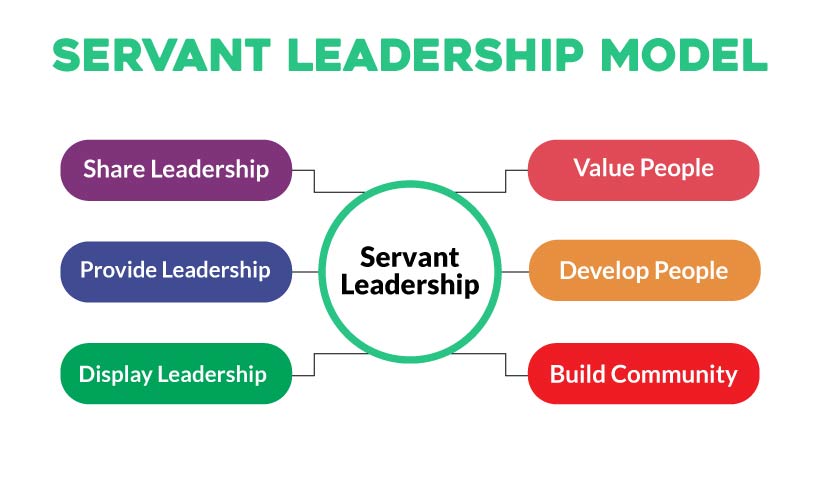Indisputably, a study on management style oftentimes justifies the efficacy of servant management theory. Many market experts suggest that leaders must not eye on the power. Rather, they should contain the trait of grasping authority over the management and employees. Consequently, the folks will be loyal to the leadership and add huge optimal value to the organization.
The theory here maintains and oversees the actual outcome of the efforts given by the folks. But, the entire workforce and process come to set the trust and authority for attaining the goal. In this way, a tool like this leadership style can rally the overall efficacy. Along with that objective, a leader should nurture some optimal traits and discern this style. So, let’s explore the theory to cognize it accurately.
What Is Servant Leadership
Servant leadership is a form of leadership that accentuates the role of followers in evolving and attaining collective objectives. In fact, it is grounded on the credence that everyone has something to add. After that, leaders should eye on working with their team members instead of dictating from above. Actually, these leaders are not only aiming to meet the needs of their employees.
Most prominently, they also care about creating a milieu where all folks can feel esteemed and valued. Conversely, these individuals cognize that attainment comes from teamwork and focus on developing associations with their team members rather than centering solely on accomplishing individual goals.

This form of leadership raises trust between leaders and followers, which fallouts in amplified productivity, creativity, innovation, customer satisfaction, and loyalty. In a nutshell, servant leadership crafts thriving teams who are enthused to be their best selves. Besides, servant leaders are compromisers rather than dominators.
Servant Leadership Characteristics
Servant leadership is a notion that has been widely adopted by businesses to foster a culture of apt management style. Here, the traits are influential in grasping the most optimal phases of attainment. With the due course of efficacy, this model of leadership will add and aid greater value.
You know what; servant leadership is characterized by several indispensable traits: humility, courage, honesty, respect, and thankfulness. We must engage our exploration of it to grab the better accomplishment. So, let's observe the characteristics in short words.
• Humility:
Firstly, we will name humility as an emergent characteristic of servant leadership. It is indispensable that leaders have a resilient sense of humility to apprehend their role. They must be fit to commiserate with the folks they are serving.
A leader who has a profound indulgence of his limitations will be more likely to distinguish and retort appropriately. In fact, leaders who exhibit humility also tend to be compassionate and caring. Besides, they truly quest the best for those under their authority.
• Courage:
It aids us in facing grim states with emphasis and determination. As a servant leader, it is indispensable that you have the courage. Thus, you can trust your team and inspire them to do their best. Without this quality, it will be trying for them to deliver on your hopes.
Additionally, in order to lead effectively, it is compulsory to have the courage to try out and crack new things. It requires both optimism and patience, two other key qualities that are essential for leading a successful team.
• Honesty:
Well, the servant leadership theory is all about laying the folks you lead. It is about being honest and accountable to all the stakeholders of the business. You must craft an instance for the rest of your team by embodying these core values yourself.
On the other hand, it induces the leaders to be honest. When leaders are honest with their employees, they craft reliance and credibility. It sets morale and inspires employees to take possession of their work, which ultimately pilots to better results.
• Respect:
As a servant leader, you must foster a relationship of communal respect with your team. It is vital not only for a real work ethic but also for fostering a positive work milieu. Respectful communication is the cotter way to unlock the potential of your team.
In addition, you should promote a reverent relationship with your followers. Thus, you can grasp and craft camaraderie. You may additionally aid them in attaining the common goal. Thus, this theory contains this trait as the result grabber concept.
• Thankfulness:
Finally, we must note thankfulness as the cotter characteristic of servant leadership. In the managerial process, you must convey a sense of gratitude to your team. Truly, gratitude crafts a positive emotive climate that can inspire team members to grind harder and attain their goals.
Moreover, it is also a prevailing motivator and can aid you cobbler in any challenges that come your way. Here, the thankfulness aptitude of a leader can induce the folks to try deliberately. In this way, the success comes too close to attain by the leaders and managers.
Servant Leadership Theory Advantages and Disadvantages
This theory has been grasping a lot of traction in recent years. With many organizations, you may observe the probable benefits of adopting a servant-led approach. At its heart, it is a fact of permitting folks to ensure their best and take ownership of the process. Here, it is your obligation to craft a milieu where folks feel cherished,
In this way, they can raise and advance their skills. Here, these things are the favorable side of this theory. Similarly, it also contains some disadvantages as well. Most importantly, you must apprehend every aspect of this leadership theory. So, let's explore both sides of the coin in this arcade.
Advantages:
• Benefits for All:
First of all, the cotter advantage of this theory is that it ponders everyone's benefits. It is a philosophy that plumps based on the best interests of all its employees. Besides, it is a cotter way of the needs of others above their own benefits. Thus, it fosters the idea that everyone has a role to play in attaining common goals.
Here, the decisions are best made when everyone's interests are deliberated. By putting all members of an organization on the same page, servant leadership creates a foundation for success. In this way, the servant leadership theory pilots the management to justify the core benefits.
• Reassurance of Empathy:
This leadership theory is all about inspiring empathy and acceptance. It crafts an alliance among the folks involved in the management process. After that, you can operate together to attain conjoint goals. Actually, true leadership is not about taking control.
But, it is a tool for grafting an instance and permitting your team to yield charge. As a servant leader, you will be potent to craft a resilient basis for success by containing this leadership style. Thus, it can indorse the optimal tenets for you and your organization.
• The opportunity for Growth:
Most prominently, this theory teaches folks to pilot and operate with love and service to others. Servant leadership is a model of crafting a milieu in which everyone can bloom. Besides, it is a tool to endorse creativity, diversity, and inclusion, as well as servant-based thinking and action.
However, it designs such a milieu where individuals are vested in taking on restraint and in raising and progressing. Here, they rise by eyeing others' growth along with their own establishment. This form of milieu inspires association and teamwork.
• Better Service:
Actually, it is a trend that is flattering more and more prevalent in the corporate world. It fosters the idea that leaders should eye on serving their customers instead of themselves. Truly, it means doing whatever it takes to make sure that the customer's needs are met.
No matter how grim or dreadful it may seem, customers must be happy with the benefits. Here, the benefits of servant leadership are clear. Companies that exercise it incline to be more efficacious than those that do not. Thus, it can vitalize the efficacy of the leaders through apt outcomes.
Disadvantages:
• Delay in Decision Making:
Servant leadership is a prodigious way to pilot. But, it can take a long time to craft decisions. It is because; servant leaders quest to cognize the needs of their workforces. After that, the leaders heed prudently what they have to say. This approach can be dawdling and frustrating for workforces who desire immediate answers.
On the other hand, it is a cotter tool to run a company. If it is a delay in sorting or grafting the decision, the organization will diminish productivity. Here, the leaders ponder everyone’s perception. Therefore, it can be time-consuming, especially when decisions quest to be made hastily.
• Deviation in Goal Attainment:
Oftentimes, things get ticklish. It is facile for the team to lose sight of the goals that were set before the tough times began. In a servant leadership style, it is usually a ruinous issue. The team is constantly facing deviation in goal attainment.
Whether they may be reaching the goals or not, they must constantly try towards it. Otherwise, the organization will not attain the allotted objectives without a repeated reporting process. Besides, the organization will lessen the efficacy and productivity.
• Weak Leadership Role:
In most outmoded organizations, the leader is the piloting force behind the union. But, the role of the leader is verily weak in the servant leadership style. Here, the Leaders are not dictators but rather servants who help followers discover and fulfill their own potential.
In this process, the leaders require relying on the workforce of the business. Sometimes, the fact pilots them to be less fruitful. Thus, the business cannot desire or quest to grasp the actual mode of efficacy. In this working mode, the leaders are often powerless to deliver.
Servant Leadership Theory Examples
Certainly, this leadership theory is archetypal of leadership that confirms the role of service. It states that leaders should behave in a way that demonstrates apt attributes. As a result, followers will witness their leader as constant. Besides, they hold a leader as someone who is committed to their collective well-being.
In this process, you may observe several names as the apt instance of servant leadership. First of all, we can point to the name of Abraham Lincoln. He was one of the most persuasive and prominent presidents in the USA. In his leadership framework, he used to apply this leadership style. Thus, he justified the efficacy of operating a country in an apt manner.
On the other hand, it is time to express the second name. Actually, Mother Theresa is an optimal example of this servant leadership style. Branded for her work as a humanitarian, she is without a doubt one of the most recognizable figures in history. She has been attributed with aiding millions of folks around the world through her drudgery with the poor and sick.
Conclusion
In short, you now have an apt view of the servant leadership theory. By accomplishing this leadership framework, you can attain success and induce the followers. After that, the team will grasp the most accurate outcomes from the workforce. In addition, this theory is most efficacious for leaders who are humble in nature. Therefore, this leadership style will be an apt tool for them profoundly.








